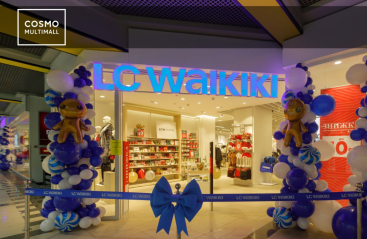
The coronavirus pandemic had significantly affected the world economy when it tanked consumer demand for numerous goods and services. In limbo, the mass consumer prefers to Save money rather than spend them every day. People have taken a wait-and-see attitude in the event of job loss or reductions in income.
According to DZ bank, the financial savings of private households in Germany grew up to a record 7.1 billion euros last year against 12.9% in 1991 and 1992. However, financiers worldwide foresee consumer activity’s boom once the coronavirus situation stabilizes. Ukraine is the exception to the global consumer trends. National retail is going through a difficult time. At the same time, a sphere of retail trade remains the most stable part of the economy that ensure national food security. We talked to Andriy Zhuk, a co-founder of the Retailers Association of Ukraine (RAU), about the current situation and prospects.
The retail’s part increases rapidly
DS: What is the role played by retail today? Has its part in G.D.P. increased during the pandemic?
A. Zh.: The retail’s part in the economy is increasing essentially. There were no retailers in the top-10 of Ukrainian companies ten years ago. However, we see the ATB chain as a leader that has declared the turnover of 150 billion hryvnias. It means that this retailer has been strengthened in its leadership. Apart from ATB, nearly 15 national retailers, including gasoline, are in the top 100 of the most successful Ukrainian companies. Retail also consists of malls, logistic companies, and equipment suppliers. In this way, every fifth employee in Ukraine is involved in this segment. Today, the retail’s part of the Ukrainian economy is nearly 20%.
DS: We have seen high investment activity in retail recently, meaning merger and acquisition processes, chains’ development via their expansion. This trend is particularly notable when it comes to network retail. What could this be related to?
A. Zh.: I see these signs. First, we closed a big deal for the Ukrainian market, meaning buying Novus (Billa chain). In this way, Novus has significantly increased its stores to compete with Silpo, its main rival in Kyiv. Then, we saw how the Prostor chain bought Cosmo early last year. So we have two big merger and acquisition deals. The sign is not bad. However, I wouldn’t be too optimistic to state that the investment climate is okay in Ukraine. Unfortunately, very few foreign chains come to the market. Ukrainian investment within the world and even European economies is just a drop in the bucket. By the way, one more rarely mentioned deal took place: Luxoptika sold the part of its company to a French player. In other words, summing up all the facts, I confirm the market’s recovery. However, it would be inappropriate to tell about positive global processes. The market is still not very attractive.
Retail as the guarantor of food security
DS: Has the organized chain retail become one of the few businesses that don’t force its employees to work remotely, provide permanent employment, and reduce overall social tension?
A. Zh.: I’ll divide this question into two parts. First, yes, the companies working during the lockdown and selling food, pet stuff, medicines haven’t fired or made any employee work remotely. Moreover, they save their salaries’ levels. Stores under limitations reassigned their employees (shop assistants, security officers, etc.) and essentially decreased their wages last year. Those working in offices have been put on half-pay.
DS: Whether organized food retail could be regarded as a part of the national food security system under pandemic and related risks for the population?
A. Zh.: Definitely. Chaos and panic reigned on the market last year when people didn’t understand what was going on. At the same time, no food store chain (for example, ATB) closed. All of them were working. Meanwhile, it’s challenging to standardize the business processes and workflow when public transport doesn’t work. Retailers had to spend much money on their staff’s trips to workplaces and backwards. However, all stores continued to work. These witnesses that retail is an absolute guarantor of the country’s food safety. Besides, commercial facilities responded very quickly to the deficit of facemasks, disinfectants, and other goods that hadn’t been on display during the first month of the pandemic. Retail bought them promptly in sufficient numbers. So, there is no deficit until now, indicating that retail responds flexibly and instantly to consumer demand.
The best country’s way to help is to walk away
DS: How fundamental are chain retailers as employers and taxpayers? Can we expect that our country will appreciate their stabilizing social role, and the system of State regulation will become less repressive?
A. Zh.: Retail is crucial. For example, ATB means 70,000 jobs, while EVA provides 30,000 workplaces. This is pretty much. Organized retail creates employment! Moreover, the market leaders came to towns. Today, their stores work even in localities with less than 10–15 thousands people. So, chains create new jobs in small towns, paying competitive salaries. As for the state regulation, it should allow this branch to work trouble-free.
The State aid is necessary to address the issues of too high acquiring commission that is 2% of each transaction. The retail pays this commission to a bank that has installed terminals. Then, it is distributed among the banks that have issued the card and international payment system. This is too expensive. The retailers requested the State to solve the legislative level since it is neither acceptable nor sustainable.
DS: Does the organized retail’s expansion reduce the underground economy?
A. Zh.: Yes, it does. I’ve never known that anyone couldn’t get a check. I don’t see any pharmacy that could let a customer go without a check. It means that money goes through POS, and the taxes benefit the State’s treasury. In this way, organized retail contributes greatly to a legit economy.
The potential for increased tax revenue generated by the fight against the underground economy
DS: Can we predict the increased tax revenue on an equal footing with retail’s development. Do such operators as ATB, EVA, and other large chains have the growth potential?
A. Zh.: The non-retail part is quite essential in Ukraine, meaning markets, second-hand shops, etc. If you look at Poland, you won’t notice such a large amount of unorganized commerce there as in Ukraine. No one can calculate the exact quantities, but on average, informal trade reaches 50%. First and foremost, it has dire consequences for customers since they cannot return or exchange low-quality goods without checks. That’s why reduced unorganized retailing will lead to organized one’s growth, increasing the contribution to budgets at all levels. For example, ATB paid 16 billion in taxes in 2020.
DS: What are the prospects for organized retailing’s growth shortly? What will be the growth’s primary drivers, and what the key risks?
A. Zh.: I’ve already said that the informal retailing reduction is the solution to growth. Organized retail’s expansion on the market provides enormous opportunities for the entire sector’s further development. Now, let’s talk about factors that hamper its growth. The purchasing power is based on people’s confidence in the future. If customers lack this confidence, they reduce their purchases. People are not in the mood to buy anything when they hear about 17,000 patients and 256 deaths. In other words, sales are down even if the population has money. However, sales grow again once the situation changes.
Hence, the pandemic is the primary threat on the one hand. On the other hand, the market becomes globalized: the big get bigger, the small get smaller and leave the market after all. An example is what happened to the home appliance market. Do you remember such large chains as “Mega Market,” “ABC Appliances,” “PobutTehnika, “CityCom,” etc.? Where are these companies now? Eldorado, Foxtrot, and some others survived on the market. Maybe, only one network will work in the future, as happened in the USA some years ago. The same happens with the jewelry retail market, where two or three players remain. On the other hand, this regular and civilized path that many countries have taken.
What about food retail? Nearly 165 companies currently work in Ukraine. They sell food. It means that the food market is pretty extensive and stable in Ukraine. Apart from famous significant players, many smaller companies interested in this business have appeared on the market.
Source: dsnews.ua



